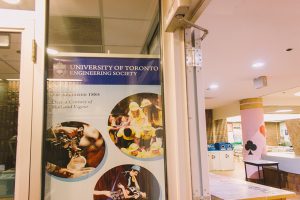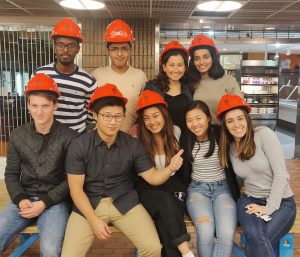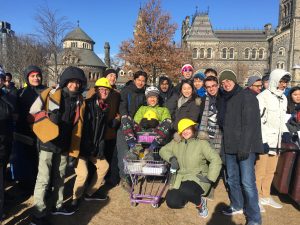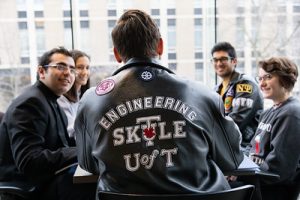57 Days to go….!
Welcome back to the blog!
This week I am starting a series of posts talking about the various ways you as a new U of T Engineering student can get involved in the Skule community and beyond. But before I do, I’d like to spend a moment to talk about some of my personal motivation for getting involved:
Why you should get involved
You can expect to spend 55-60 hours a week on schoolwork for engineering (this includes your class time, studying, group projects, etc.). For many this is a drastic increase to what they experienced in high school. You might find when you first start that it feels like a lot piling up all at once, and that’s a very understandable sentiment to have. The beauty of being involved in co-curriculars in engineering is that they’re very accessible and fit nicely into the blocks of free time you will have in your schedules. All co-curriculars that run in the evening tend to start after 6pm to accommodate first-year students that have classes until then, and typically don’t run later than 8 or 9pm to accommodate commuter students who leave campus each night. Co-curriculars also run on weekends and have some flexibility about accommodating your personal timetable. Even as engineering looks to have an online Fall semester for first-year students, all of our co-curriculars will be running to some extent virtually which means everyone can get involved in student groups regardless of where they’re living come September. Moreover, getting involved in co-curricular activities in university has been shown to promote better mental health, as it allows you to channel personal- or academic-related stress through a productive activity you enjoy.
Co-curriculars are also a great way to meet other students who aren’t necessarily in the same year or discipline as you which, believe me, is something I highly encourage you to do. It can be really refreshing after a while to have conversations that aren’t always about homework or exams (trust me, you’ll have plenty of those with your classmates already), especially if you’ve got other hobbies or interests you want to share. Once you get into 3rd and 4th year, you might even find yourself taking courses with students outside of your program, so it’s great to know a few beforehand.
That being said, it’s completely okay not to get involved either. Many students have commitments outside of engineering which take up their time in other ways. However you spend your free time, it’s fantastic when you’re doing something that supports a healthy work-life balance.
While I personally haven’t been involved in even a fraction of all the student groups and organizations we have in engineering, I’ll try my best to cover the major categories as best as I can. I will also link web pages and resources that will help you find more information on exactly how to contact these groups if any of them pique your interests further.
Alright, let’s get started!
EngSoc (Student Government)

The U of T Engineering Society (commonly referred to by students as EngSoc) is our official student government here in Engineering. The four primary pillars and what I would call mandates of EngSoc are to:
1) Support student clubs and design teams through affiliation and resource allocation;
2) Provide academic advocacy;
3) Allocate funding to student groups and Skule’s commercial operations; and,
4) Manage Skule publications and communications.

EngSoc is run by the President and four Vice-Presidents. You can recognize them at major Skule events by the white hardhats they wear. They each oversee their own portfolios consisting of project directorships run by project directors, all of whom are upper-year students in engineering. I would be remiss if I didn’t share the What is EngSoc video with you all here, which goes into a more detailed structure breakdown of EngSoc for those interested. EngSoc also provides funding grants for students to attend conferences, and academic resources like Skule Courses. No matter who you are in engineering, we’re all members of EngSoc and we all are able to utilize and benefit from the services they provide. The main website and go-to space for all things EngSoc is skule.ca.
So how can you, a 2T4, get directly involved in EngSoc? There are three ways one can take on an official position in EngSoc as a first-year student:
1. Class Representative
Each of the 10 first year disciplines (Track1, Core8 & EngSci) elects one student as their first-year Class Representative, or “Class Rep”. The Class Rep is responsible for advocating on behalf of their class (e.g all of the TrackOne’s, or all of first year ChemEng students, etc.) to the instructors and departments. Sometimes a conflict might arise if multiple assessments are assigned to the same deadline, or a course can benefit from a homework extension, or the class finds that something the instructor is doing isn’t working for their learning. When that happens, it’s the Class Rep’s responsibility to reach out to the instructor or Associate Chair of that

department, and work together to develop a resolution that’s in the best interest of the class. As a Class Rep it’s also your job to get to know as many of your peers in your class as possible (in some disciplines with smaller class sizes it’s even possible to know everyone!). That way when an issue comes up, your peers feel comfortable reaching out to you with their concerns or questions.
2. First Year Representative on the Board of Directors
The EngSoc Board of Directors is responsible for all of the operations of the Engineering Society. They vote on all major decisions including by-law and policy changes, funding initiatives, and the creation of committees. The Board of Directors has three First Year Representatives who collectively represent all first-year students in engineering. As a board member you’re required to attend all monthly Board meetings, and vote on behalf of the best interests of your constituents.
3. First Year Chair
The role of First Year Chair (FYC) is a little different than the first two positions I’ve listed. Its mandates focus more on community building rather than on rules and policies. There is one FYC elected to represent all first-year students. The FYC runs events and initiatives throughout the school year and summer months to bring first years together. Examples of events put on in the past include a Finals Stress-relief session, Coverall-Decorating Party, and Drop-in food events. They are also responsible for organizing the annual First Year Prank, and recruiting a team to compete in the annual Godiva Week Chariot Race (I’ll talk more about Godiva Week in another post soon). I had the pleasure of serving as the Class of 2T2’s First Year Chair two years back, and it was such a fun and gratifying experience that I recommend it to anyone with a passion for bringing people together.
All three positions are elected roles and only the students/constituents you serve in those roles are eligible. Elections run in mid/late September, and weeks before that all students will receive an email from EngSoc with details on election proceedings. Information about how all elections run within EngSoc can be found at http://elections.skule.ca.

In the coming weeks I’ll be talking about how to get involved in Clubs, Design Teams, Sports, and Volunteering in Skule. Until next time, have a wonderful week!
Mirjana



